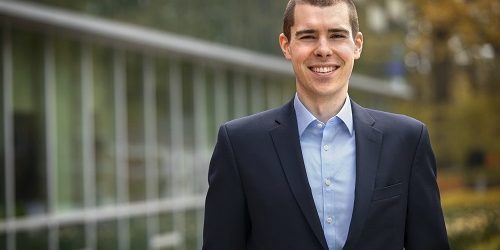Michael Foley graduated from CIPA in May of 2017 with a concentration in Science, Technology and Infrastructure Policy. He currently works at Landrum & Brown in Cincinnati, where he serves as a Consultant in Aviation Forecasting and Financial Planning.
Why CIPA? There are a lot of MPA programs around—what made you choose CIPA over other programs you were considering?
I only applied to CIPA. There were no other MPA programs I found that had an infrastructure related concentration. The choice was easy.
What are your long-term career goals? How did CIPA help prepare you for these?
To work in the aviation industry—my career choice—or the transportation infrastructure realm in general, one needs both policy and financial acumen. I took advantage of the flexible curriculum structure at CIPA, enrolling in classes that allowed me to obtain the specific skillset I wanted to acquire.
What would you tell a prospective student who asked you to list the top three reasons that CIPA was a good fit for you?
I would say: affordability, flexibility of the curriculum, and the fact that it offered an infrastructure-related concentration.
Are there any particular “stand out” experiences at CIPA that made a lasting impact on you?
For me, this would include my capstone project, and my time serving as a GTRS for Professor Rick Geddes. For the CIPA Capstone, I worked on a project that involved interfacing with staff at the New York State Comptroller’s Office. Doing a project that attracts a high-level audience is always gratifying, and at the same time motivating when you know your work will be read by subject matter experts in the field. Serving as a GTRS during my last semester at CIPA provided me the opportunity to work on a research report with both Professor Geddes, and another professor from Ireland, which will eventually be published in a professional academic journal. Taking courses from across the university while at the same time being able to take a deep dive into a specific research topic provided me with a very well-rounded education at Cornell.
How would you describe the sense of community you find at CIPA? How did that figure into your experience of the last two years? How do you see it figuring into your future experiences?
Although a small program in number, CIPA’s student body is very diverse. With diversity comes cultural differences, customs, etc. Yet even with these differences, I have found the community at CIPA to be extremely friendly and welcoming. Know that your quality of life will be greatly impacted by whom you surrounded yourself with, either in the workplace or academia. My experience in Ithaca during these past two years was defined by the people I met from across the world, and the lifelong friendships that were forged.
Is there anything else about the CIPA program, about the opportunities here, or about your particular experience that you would like to share with prospective students?
A lot of prospective students often hear about the flexibility of the CIPA curriculum as being a positive characteristic of the program, which it is. However, this flexibility bears a high degree of responsibility and preparation on the part of each student. I encourage every prospective student to begin thinking about where they see themselves following graduation, and work back from there. What classes (and concentration) would best prepare you for your life after CIPA? What could you do over the summer between your first and second year (i.e. summer internship) that could help you obtain that end goal? What classes could you take during your first year that would help you obtain that summer internship or research position? The first semester counts, and the sooner you develop your plan of action, the better.

